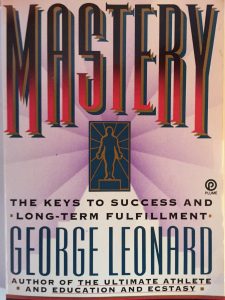“Mastery is not perfection, but rather a journey
and the true master must be willing to try and fail and try again.”
George Leonard
 Thirty years on my bookshelf have caused the pages to yellow a bit, but the message for the most part still shines brightly for me. I just reread Mastery.
Thirty years on my bookshelf have caused the pages to yellow a bit, but the message for the most part still shines brightly for me. I just reread Mastery.
Leonard’s emphasis for writing this book was to bring awareness to the downfalls of what he saw as a growing quick fix and shallow culture. He calls this America’s war on mastery. This was before the days of Internet and cell phones, so the message resonates even more for me now.
Mastery involves loving the plateau in performance and learning. That plateau is when most people quit a pursuit as the excitement of the newness is over. Mastery involves showing up anyway. This applies to any endeavor.
Leonard was a pilot in the Air Force and draws from what he learned teaching pilots during WWII. He went on to become a well-known American aikido sensei, teacher.
He describes the five keys to mastery as:
- Instruction – on the path of mastery you are likely to have a variety of teachers
- Practice – this is the showing up on a regular basis even on the plateau; most on the path of mastery don’t necessary practice to get better, but because they love to practice
- Surrender – be willing to look the fool at not knowing, surrendering that you must already know everything
- Intentionality – clear vision of what you want to accomplish overriding the mechanical step-by-step
- The Edge – after years of practice and learning step out and take a risk it, play with the expansion
Personally, the two things that really spoke to me this time reading Mastery are the idea of making the in-between times part of your practice and the learning from teaching beginners.
Most of life exists in the in-between mundane things of getting ready, driving, eating, shopping. When you can bring presence (or center, if you’ve studied with me) to the mundane. This practice actually prepares you for your time on the plateau for whatever you are mastering.
Teaching beginners demands that you slow down and go back to basics. You must study deeper to actually be able to teach something to someone who knows nothing. Again, bringing presence and loving that plateau where it may not be so exciting.
Leonard’s book is worth reading. I will be placing my copy back on my shelf and read it again when it calls.
In closing, Leonard shares while most of us aspire to Mastery often we fall into one of these categories:
Dabbler – jumps from thing-to-thing until the initial enthusiasm wanes
Obsessive – works way too hard at mastering something fast and is frustrated putting the time in on the plateau
Hacker – puts in the time and shows up, but doesn’t explore beyond the entry level
Good to know these traps…I am going to go practice now! Karen

